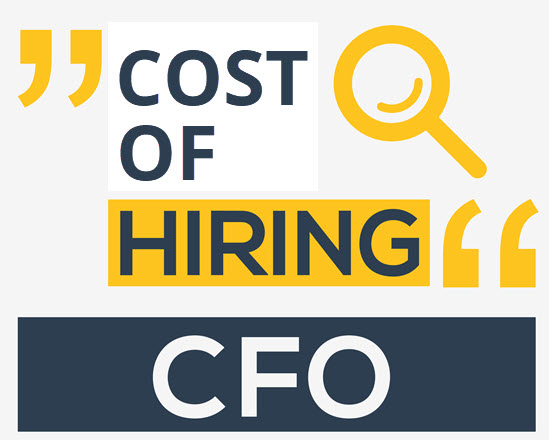
Most business owners I speak to look at finance and accounting personnel as an overhead cost. While they are most certainly a cost, the benefits that a CFO brings can alter that “cost” narrative into one of “investment.” Today I will help you define a CFO's role as one who is viewing your organization in a forward-looking manner and how they can be a good investment.
Finance & accounting staff and the role the CFO plays
Finance and accounting staff play a variety of roles. However, in a broad sense, the CFO role is unique in that it generally focuses on the future needs of an organization. CFOs are often the voice of the organization to both executive management and third parties relative to the company's financial performance. This can include financial or operational performance, financing needs, working capital needs, as well as working with your bank, public accountant, or shareholders.
By focusing on these areas, a CFO’s primary role is to help a company avoid surprises. As you have likely experienced, surprises in business can be expensive. Developing strategies in advance of potential issues can mitigate that cost and, in many cases, lead to better outcomes.
For example, if a business is contemplating a new geographic market, forecasting the cost of that endeavor based on variable revenue results can help a company determine the range of working capital it will need to meet various sales objectives.
It is not the CFO’s job to predict the future
The CFO’s job is not about predicting the future, but rather, it is to predict various outcomes so you can influence the future. Setting the course of the ship is generally the CEO’s job. A CFO complements that effort by analyzing the potential outcomes based on where the ship sails. To do so, they use a variety of tools to assist in that effort.
There are common tools a CFO will use
A CFO will use a variety of financial reporting and analytical tools to both monitor company performance and forecast future results. It will enable them to:
Coordinating the development of a company budget and periodically updating the forecast based on actual performance is a standard best-practice among CFOs.
2) Understand contribution – both from a revenue standpoint, and a net income position
A cash forecast that identifies future cash obligations. (differing from a budget in that it accounts for cash timing differently than the cost matching you would find in a budget)
4) Identify & mitigate risks to the organization
5) Create a hub for various initiatives and coordinate their impact on one another
6) Assess staff requirements across the organization
7) Assess others’ assumptions and their impact on the organization, particularly within the leadership ranks of the organization
These activities also enable a CFO to measure risk in a variety of areas. (For more information, visit the CFO Selections Risk Assessment tool.) An evaluation of the relevant risks to your organization often leads to a refinement of strategy, and potentially a change in goals or expectations.
Part of developing a budget is meeting and discussing future needs of the various leaders and coordinating responses to distill many goals and objectives into a thoughtful, cohesive plan for performance.
Your CFO will be evaluating risk factors throughout these discussions and incorporating their cost into a budget or finding other ways to mitigate their impact as part of the planning process.
Once these tools are utilized and the information has been populated, what does a CFO do with the information?
The CFO’s role does not stop with the creation of a forward-looking plan. Once the plan has been completed, they will continually evaluate the underlying assumptions of a budget, and constantly review the performance of an organization in the face of those assumptions. The CFO uses content and data to support observations, help others in the organization be more effective with their execution.
Whether minor deviations or significant changes, comparisons to actual results point executive management to areas that need additional attention, or validates that expectations are being met. Both are essential to achieve planned results.
There are several ways to get access to that level of experience and expertise
1) Add a full time CFO (this is a more expensive option)
The good news is that a CFO can be utilized in any size organization. Mid to large companies will likely have a full-time CFO as part of the executive management team.
2) Add a fractional CFO
Smaller organizations may need access to a CFO’s higher level skill set on a part-time basis. Even one-day-per week can bring additional focus to the important items noted above, allowing for the identification of key issues before they impact the organization.
3) Add a project CFO
Utilizing the services of a CFO on a project basis to evaluate, and/or validate your strategic planning can serve a useful purpose.
Cost savings a CFO provides
Thinking of a CFO’s activity as an investment in your company’s future changes the paradigm from cost to potential returns. These returns are often realized by avoiding unnecessary complications because your CFO was able to identify pitfalls in your future strategy before they occurred. What is the value of an error or issue that was avoided? There are contributions a CFO can make beyond budgeting and reporting.
- M&A support
CFOs can be an asset with other significant organizational initiatives. It is quite common for a CFO to lead in merger and acquisition work, whether targeting a company for sale or acting as the primary liaison with a potential buyer.
- Building a forecast for raising funds
Organizations often assign a CFO the responsibility of improving their working capital, whether it is improving or changing an existing banking relationship, finding debt funding, or raising equity.
- Evaluating the current staff requirements
Evaluating the current staff requirements for the finance and accounting function of any organization is often the purview of the CFO as well. The smaller the company, the broader CFO operational contributions become. CFOs will often apply their financial and analytical skills to the needs of companies on the shop floor, warehouse, or virtual e-commerce platform… whatever your particular focus may be!
Conclusion
When evaluating the cost of hiring a CFO it is important to consider the benefits received through the CFO’s cost-savings, contributions and expertise. When you make that calculation, you will find that hiring a CFO will pay for themselves.
About the Author
 Kevin Briscoe is the Executive Manager for CFO Selections. He is responsible for establishing and implementing goals and strategies for the firm. His professional career spans nearly 30 years in finance, accounting, and operations in publicly traded corporate and small, closely held settings.
Kevin Briscoe is the Executive Manager for CFO Selections. He is responsible for establishing and implementing goals and strategies for the firm. His professional career spans nearly 30 years in finance, accounting, and operations in publicly traded corporate and small, closely held settings.
Kevin excels in financial analyses and accounting operations, implementing internal controls, and creating and implementing organizational systems. He has held ownership and management positions, demonstrating an outstanding ability to provide effective leadership in increasing profitable growth throughout his career.





